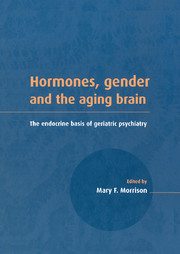Book contents
- Frontmatter
- Contents
- List of contributors
- Preface
- Acknowledgments
- Part I Overview
- Part II Hormones and mental health in the elderly
- Part III Effects of hormones and behavior on immune function
- Part IV Hormones and gender differences in psychotropic drug metabolism
- 15 Gender differences in psychotropic drug metabolism
- 16 The influence of progesterone on the pharmacokinetics and pharmacodynamics of gamma–aminobutyric acid–active drugs
- Index
16 - The influence of progesterone on the pharmacokinetics and pharmacodynamics of gamma–aminobutyric acid–active drugs
from Part IV - Hormones and gender differences in psychotropic drug metabolism
Published online by Cambridge University Press: 18 September 2009
- Frontmatter
- Contents
- List of contributors
- Preface
- Acknowledgments
- Part I Overview
- Part II Hormones and mental health in the elderly
- Part III Effects of hormones and behavior on immune function
- Part IV Hormones and gender differences in psychotropic drug metabolism
- 15 Gender differences in psychotropic drug metabolism
- 16 The influence of progesterone on the pharmacokinetics and pharmacodynamics of gamma–aminobutyric acid–active drugs
- Index
Summary
Introduction
The question of how hormones affect response to drugs is closely related to the separate question of how the aging process influences response to drugs. One can readily acknowledge that the production and secretion of gonadal hormones change with the aging process through childhood, puberty, and adult life, including the young adult, middle age, and late life. Additionally, exogenous administration of hormones is important, particularly for women. Many women take oral contraceptives during mid-life, and they often take hormone replacement therapy in late life. The latter leads to a possible confounding of the aging process and hormone administration with benzodiazepine administration.
We first addressed the potential for hormones to affect drug pharmacokinetics and response in 1982, when we designed a study to determine whether oral contraceptives interact with benzodiazepines. Intrigued by the difference in response between the women who took oral contraceptives and the control women who did not, we turned to the literature on estrogen and progesterone. In doing so, questions progressively became focused on progesterone, its neurosteroid metabolites, and aging. The chapter provides an overview of the combined pharmacokinetic and pharmacodynamic approach and its application to the evaluation of the influence of aging and hormones on drug response.
As indicated in Fig. 16.1, there is a link between drug dose and drug effect (Holford & Sheiner, 1981).
- Type
- Chapter
- Information
- Hormones, Gender and the Aging BrainThe Endocrine Basis of Geriatric Psychiatry, pp. 334 - 350Publisher: Cambridge University PressPrint publication year: 2000
- 1
- Cited by



